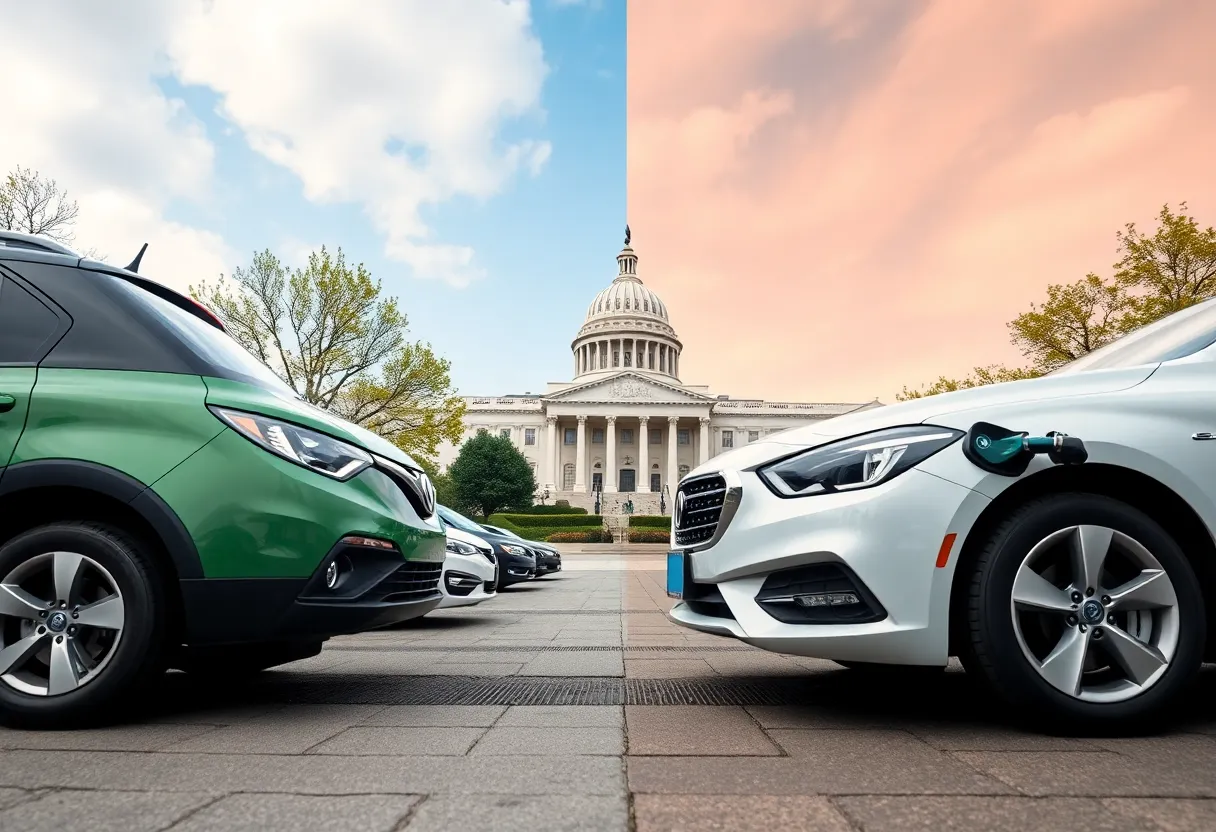News Summary
On May 22, 2025, the U.S. Senate voted 51-44 to revoke three vehicle emissions waivers granted to California, raising legal and environmental concerns. The move allows for the suspension of stricter state emissions standards, including California’s EV mandate aimed at promoting zero-emission vehicles by 2035. The decision has sparked backlash from environmental groups and raises questions regarding states’ rights and future climate policies.
California – On May 22, 2025, the U.S. Senate voted 51-44 to revoke three vehicle emissions waivers granted to California, igniting considerable legal and environmental controversy. The revocation allows for the suspension of stricter emissions standards previously set by the state, which were more rigorous than current federal regulations. Notably, Democratic Senator Elissa Slotkin of Michigan joined Republicans in supporting the repeal.
The revoked waivers included two aimed at reducing tailpipe emissions from medium and heavy-duty vehicles, as well as limiting smog pollution from trucks. The third waiver, known as California’s “EV mandate,” intended to phase out gas-powered cars and mandate that all new vehicle sales in California be zero emissions by 2035, with actual implementation commencing in 2026.
This action has provoked a backlash from environmental groups that argue it undermines California’s authority to tackle pollution. The California Air Resources Board had requested these waivers, explaining that over 100 similar requests in the past contributed to a 99% reduction in vehicle pollution since 1970.
The recently revoked waivers were originally approved by the Biden administration’s Environmental Protection Agency (EPA) in 2024. Republicans in Congress maintained that the Congressional Review Act allowed them to overturn federal agency rules by a simple majority vote. However, various government watchdogs, including the Government Accountability Office and the Senate parliamentarian, countered that the waivers are not classified as rules eligible for annulment under this act.
Senate Minority Leader Chuck Schumer criticized the Senate’s action, labeling it the “nuclear option.” Senate Majority Leader John Thune defended the move by stating that the EPA regarded the waivers as rules submitted to Congress. Senate Democrats, on the other hand, argued that the vote violates established legal norms and carries the risk of setting a dangerous precedent that could lead to further bypassing of the filibuster.
The substantial implications of the Senate vote extend beyond California to 16 other states and the District of Columbia that have adopted California’s vehicle standards. As a response to the revocation, California Governor Gavin Newsom announced an intention to legally challenge the Senate’s decision, claiming that the vote was illegal and in violation of established precedents.
Environmental advocates expressed deep concern about the use of the Congressional Review Act to invalidate these waivers, warning that such actions could pave the way for the easier nullification of various executive decisions in the future. Critics have highlighted the ideological shift occurring within the Republican Party, pointing out that previous Republican leaders such as Nixon and Reagan had enacted landmark environmental laws.
The auto industry has largely supported the Senate’s revocation of the waivers, citing concerns that California’s stringent emissions regulations could negatively impact jobs and the economy, particularly for businesses still reliant on internal combustion engines. The Senate’s decision underscores a marked partisan divide surrounding climate policies, with Republican lawmakers voicing fears that California’s aggressive approach threatens consumer choice within the auto market.
As the situation unfolds, the balance of power and the implications of the Senate’s decision will likely come into focus as democratic lawmakers caution that this precedence might be applied in the future should they regain power. The ramifications of this legislative action also raise questions regarding the interpretation and application of the Congressional Review Act, given its contentious use in this instance.
In summary, the Senate’s vote to revoke California’s vehicle emissions waivers has ignited fierce debate surrounding environmental policy, states’ rights, and the broader implications for future legislation regarding climate and air quality standards.
Deeper Dive: News & Info About This Topic
- The Guardian: Republicans Move to Overturn California’s EPA Waiver
- CBS News: Senate GOP Set to Revoke California’s Car Emissions Standards
- Los Angeles Times: Senate Votes to Overturn California’s Gas-Only Car Ban
- AP News: Congress Moves on Vehicle Emissions and California Regulations
- Wikipedia: Environmental Protection in the United States

Author: STAFF HERE HOLLYWOOD
The Hollywood Staff Writer represents the experienced team at HEREHollywood.com, your go-to source for actionable local news and information in Hollywood, Los Angeles County, and beyond. Specializing in "news you can use," we cover essential topics like product reviews for personal and business needs, local business directories, politics, real estate trends, neighborhood insights, and state news affecting the area—with deep expertise drawn from years of dedicated reporting and strong community input, including local press releases and business updates. We deliver top reporting on high-value events such as the Hollywood Bowl summer concerts, the Hollywood Christmas Parade, film premieres at TCL Chinese Theatre, and festivals at the Magic Castle. Our coverage extends to key organizations like the Hollywood Chamber of Commerce and Visit Hollywood, plus leading businesses in entertainment, dining, and tourism that define the local economy. As part of the broader HERE network, including HERELosAngeles.com, HEREBeverlyHills.com, HEREAnaheim.com, and HEREHuntingtonBeach.com, we provide comprehensive, credible insights into Southern California's dynamic landscape.





